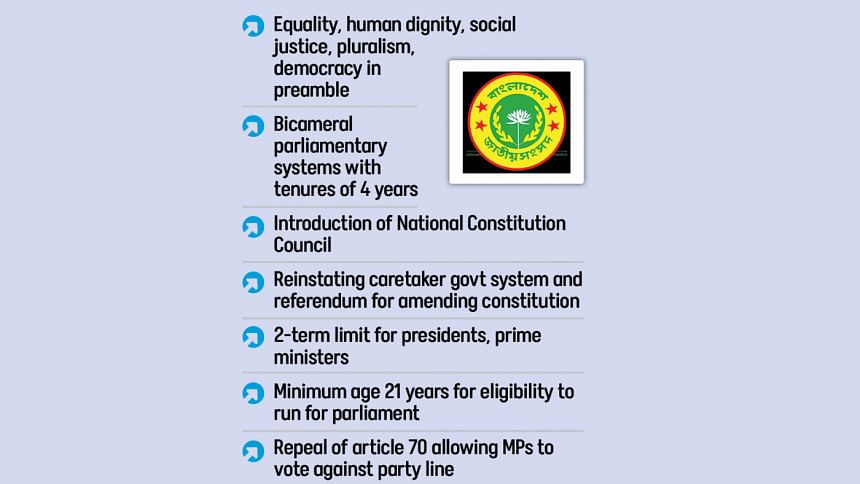Constitution reform: Sweeping changes in constitution

Expanding the fundamental rights to include food, clothing, shelter, education, internet, and vote, the Constitution Reform Commission proposes replacing nationalism, socialism, and secularism with equality, human dignity, social justice and pluralism as fundamental principles of state policy.
The only core principle retained from the 1972 constitution is democracy.
The commission also recommends an interim government to conduct elections, a bicameral parliament, two-term limits for the president and prime minister, lowering age limit of MPs to 21 from 25 and a national constitutional council to oversee appointments of constitutional bodies like the Election Commission as well as the chief adviser of the interim government.
The commission said in its recommendations that the five core principles reflect the ideals of the Liberation War of 1971 as well as the aspirations that emerged from the mass uprising of 2024. The commission recommended deletion of articles 8, 9, 10, and 12, which expanded on the key principles.
Led by Prof Ali Riaz, the commission also proposed to strike out articles 7A and 7B that barred constitutional amendments, which now have to be carried with two-thirds majority in both houses followed by a referendum.
The commission recommends calling the nation "Bangladeshis" instead of the previous "Bengalees" and further proposes recognition of mother tongues of all Bangladeshis as common or traditional languages. Bangla will remain the state language as before.
The commission advocates expanding the scope of fundamental rights and ensuring their constitutional protection through a comprehensive charter merging the second and third sections of the constitution to form a new charter on "fundamental rights and liberty". Thus, the right to food, education, healthcare or the right to vote will become enforceable in a court of law.
The commission recommends a bicameral legislature with a 400-seat lower house, or the National Assembly, and a 105-seat upper house or the Senate. The tenure of both houses are set at four years. Of the 400 assembly members elected directly, 100 will be reserved for women.
Political parties will be required to nominate at least 10 percent candidates in the lower house from among the youth. The minimum age to run in the elections will be reduced to 21 years from the existing 25.
There will be two deputy speakers with one coming from the opposition.
The recommendations stipulate that a member of parliament can only hold the post of prime minister or the leader of the house or the party chief at the same time.
Modifying, the much discussed article 70, the commission recommends that parliamentarians be allowed to vote against party line except finance bills.
To strengthen parliamentary watchdogs, the commission proposes that the standing committees be always led by members of the opposition.
The Senate will consist of 105 members, of whom 100 will be determined by the proportion of votes in the national election.
Political parties will nominate up to 100 Senate candidates of whom at least 5 will have to include representatives of marginalised communities.
The remaining 5 seats will be filled by presidential nominees who are not members of either house or affiliated with any political party.
A political party must secure at least 1 percent of the total votes in the national election to be eligible for representation in the Senate.
The Senate speaker will be elected by a simple majority from among its members.
There will be one deputy speaker elected from the opposition.
The commission recommends a National Constitutional Council (NCC) to ensure transparency and accountability in state functions and establish balance among the branches and institutions of the state.
This council will include representatives from all the three branches of the state. Council members will be the president, the prime minister, the leader of the opposition, the speakers of both houses, the chief justice, one deputy speaker of the National Assembly from the opposition, and the Senate deputy speaker, and one member elected by members of both houses, who do not belong to either the ruling party or the main opposition.
This council will remain in office even after dissolution of the parliament until the chief adviser of the interim government (charged to conduct national election) takes the oath. During the absence of the legislature, the NCC will consist of the following members: the president, the chief adviser, the chief justice, and two members of the advisory council nominated by the chief adviser.
The commission recommends the appointment of an interim government to conduct elections and remain in office until the next elected government takes oath.
The interim government's head, the chief adviser, will have to be appointed either 15 days before the expiry of the assembly or within 15 days of dissolution of the assembly.
The reform proposals lay down elaborate provisions for the appointment of a chief adviser for the interim government.
There are seven options for the appointment that the constitutional council will prioritise sequentially as laid out. The first option, requiring seven of the commission's nine votes, is to appoint any individual who is not in the commission. If that is not possible, the commission may resort to the second option, requiring six votes out of nine, to appoint any former chief justice or any former judge of the Appellate Division of the Supreme Court. If that is not possible then, the commission may, with unanimous agreement, appoint the president as the chief adviser. Failing that, the commission may then appoint the last retired chief justice as the head of interim government.
However, if the former top judge who retired last, declines, then the commission will have to approach the one who retired immediately before and work backwards. If none of the former chief justices are available or if all of them decline the appointment, then the commission will consider the last retired Appellate Division judge and failing that work backwards till they find one willing to shoulder the responsibility.
The chief adviser will carry out functions through an advisory council not exceeding 15 members.
The president will be elected by a majority vote of the electoral college, comprising each member of both houses, 64 district coordination councils and every city corporation coordination council.
The president's term will also be limited to four years with a two-term limit.
The commission also proposes the same term limit for the prime minister whether they are consecutive or not.
The commission has recommended decentralising the judiciary in an attempt to make justice more accessible. Proposals include a unitary structure of the Supreme Court while establishing permanent High Court benches in all divisional centres.
The commission emphasised the importance of a strong local government system and recommended a Local Government Commission. It also suggested coordination councils in the districts and metropolitan centres.
The commission recommends dedicating sections of the constitution elaborating on five constitutional commissions, namely the Human Rights Commission, Election Commission, Public Service Commission, Local Government Commission, and Anti-Corruption Commission.
The commission further recommends that the structure, appointment, tenure, and removal processes for all these commissions be identical. The tenure of each commission is set at four years.
The constitution commission recommends deletion of the constitutional provision that stipulates inclusion of Bangabandhu Sheikh Mujibur Rahman's speech of March 7, 1971, his declaration of independence and the proclamation of independence, which are included in the 5th, 6th and 7th schedules respectively.
The recommendations empower the president to declare a state of emergency only upon the decision of the NCC. The commission believes that during a state of emergency, no citizens' rights should be revoked or suspended, and the right to access the courts should not be suspended either.

 For all latest news, follow The Daily Star's Google News channel.
For all latest news, follow The Daily Star's Google News channel. 






Comments